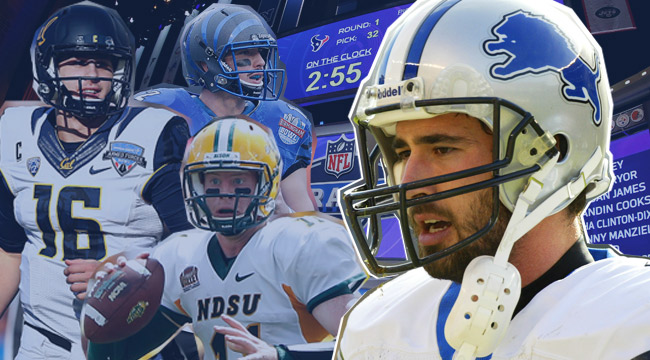
I lived with Joey Harrington in 2002, during his rookie year with the Detroit Lions. We’d grown up together and, like many 22-year-old friends, the idea of being roommates in a new city sounded awesome. I worked construction in the biting cold on 8-Mile and Joey played for an NFL team. Somehow his job always seemed less fun.
After being chosen with the No. 3 pick in the NFL Draft, Joey was suddenly rich and more famous than he’d ever been at the University of Oregon. Still, he was going to a city that was known for killing quarterbacks. That year in Detroit had plenty of high points, but I was also the witness to the moment the “game” of football, which I’d seen my friend grow up loving, became a job. I guess that isn’t the major tragedy I sometimes make it out to be. Joey was being well paid to do a job, so it stands to reason it would feel like one. Still, it was hard to witness my friend get booed or to hear him torn to shreds on talk radio.
To the surprise of every NFL scout, the league never fully worked out for Joey. He’s always seemed pretty much good with that. It made him financially comfortable and opened him up to opportunities. It allowed him to start a foundation to serve young people in Portland, the city where we grew up. But with the NFL Draft approaching, I couldn’t help wondering if he might have some advice for the young men about to be thrust into the same spotlight he was under in 2002.
What is that sensation of being about to be drafted? You’re about to be wealthy, but you also have no real control over what is coming next.
The biggest piece that people often overlook is that these are 20-, 21-, 22-year-old kids who have no control over the next step of their life. Somebody will call their name in the microphone, and then they will all of a sudden live in that city. It’s very — at least for me — it was exciting, the possibilities of playing football in the biggest stage in the world, the financial ramifications. All that stuff is incredibly exciting, but there’s a lot of uncertainty. You have to be very comfortable with not having control over that part of your life.
I get that. That’s interesting. I don’t know if I got that when we were 23.
The other thing too is every piece is connected. If a team trades up to select a quarterback in a position where an offensive or a defensive lineman was expected to go, it affects the lives of every kid who hasn’t been drafted yet. When I was drafted there were six teams outwardly looking for quarterbacks — Houston, Detroit, Buffalo, Cincinnati, Washington and Kansas City. Houston went off the board because they committed to David Carr, to take him first. Had Detroit not selected me, and Buffalo still decided to draft an offensive lineman, I could have slid down to … I think Kansas City was selecting someone around 14 or 16. Washington was traded down to the end of the draft, to the end of the first round. I could’ve gone from number 3 to number 23. It is so fluid, and every move by everybody else is connected and affects the livelihood of the next guy potentially on the board.
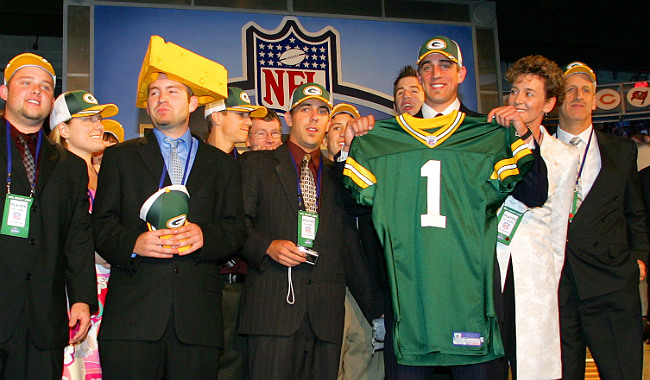
Of course, there’s the financial ramifications of that, but then you also could have potentially stepped into a setting that maybe would have fit better. It’s really like this one part of your career, this one little minuscule part or this one night even is going to set a pretty big tone.
Absolutely. What may seem like a horrible thing at the time, let’s not forget how ESPN covered Aaron Rodgers sitting in the green room — poor kid, he hasn’t been drafted yet, poor kid. He fell out of those first couple of picks that needed a quarterback. He fell all the way down to the bottom of the first round. They kept making a big deal about how awful it was, how he’s losing out on so much. What happened is he went to a fantastic football team. He got to sit behind a Hall of Famer. He got to get his feet under him. When he stepped in, he stepped into an incredible team that was able to take him to the Super Bowl. It was the best thing that could have happened. You will never know until it plays out. One decision by somebody a thousand miles away could affect whether or not you go to a team with a great defense or a great offensive line or … It’s all connected.
I remember we were in a bar your rookie year, and a woman came up and grabbed your butt. She wasn’t a woman who was in our dating purview or even close to our age range. You looked at me like “Is that what I have to deal with now?” These guys really do get under not only scrutiny but this almost familiarity. The city almost feels like it owns them. Is that just how fame works?
I’m trying to think of the best way to describe it. There’s a familial feeling when you are drafted. They embrace you as if you were a relative, but there’s an immediate expectation that you perform and that you make their team better. You are there to make their team better. You are in City X to make that team better, but there’s an infatuation with you, with your persona, with this perceived idea of who you are. If you do make that team better, and you do play well, that persona, that image explodes exponentially. If you don’t win, you’re expendable, and you’re truly pitched to the side and then move on. It’s an odd feeling.
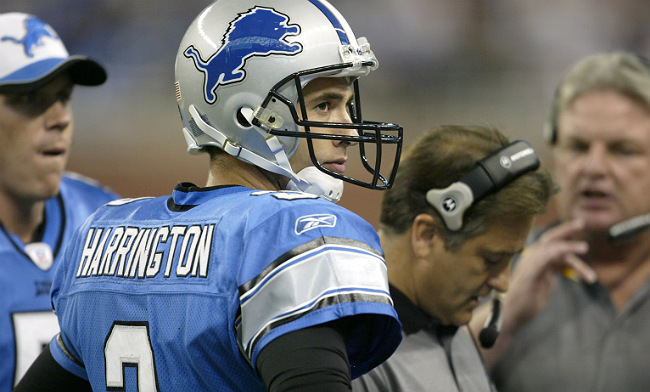
There’s a couple quarterbacks who are going to be drafted pretty early this year. What would you say to them now looking back in retrospect?
That’s a tough question because so much really has changed in the 15 years since I was drafted. I think the biggest thing that I would say in retrospect is don’t be overwhelmed by the magnitude of the moment. Don’t be swept away in the compliments and the celebration because the moment that becomes the most important is the moment you forget about what you did to get there in the first place.
Enjoy it. Realize that it’s the culmination of a lot of hard work. But on the other it’s simply the beginning of something else where if you don’t succeed, if you don’t exceed expectations, you’ll be branded a failure.
Tell me about the Wonderlic Test and the Combine. What are your emotions during that time? And who do you have consulting you? In your case you had your agent consulting you?
You prepare for all of this stuff like it’s a test in school. They prep you for everything. You take practice Wonderlics. You specifically train for the Combine tests. The off-season training you do afterwards isn’t general football readiness for next year. It’s “do well at the Combine” training.
The Combine was really weird, just really uncomfortable. You felt like cattle. You don’t even have a name. You are QB No. 4. You’re running back No. 17. I mean they stand you up in front of 250 guys, 250 executives with pen and paper, and you’re standing there in your boxer shorts. You step on a scale and they read it out and everybody starts taking notes. They wake you up at four in the morning so you can take a drug test, to then get back up at 7:30 to go run and throw and jump for your professional lives. I mean, it’s not a situation that’s conducive to excellent performance.
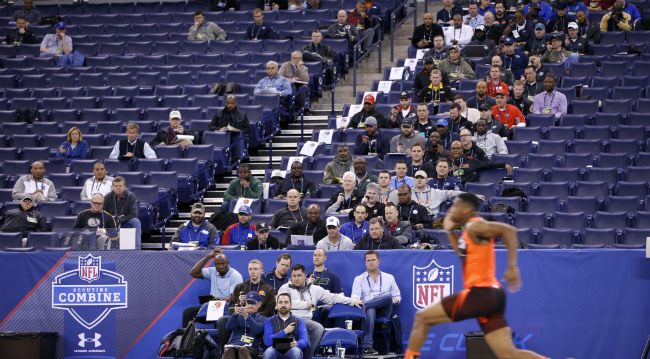
I think part of what they want to see is how you handle it. How do you handle being woken up in the middle of the night to take a drug test and then coming back and performing? How do you handle sitting in a waiting room for hours upon hours and then, you know, getting up and being ready to go at a moment’s notice? I mean, it was just a really odd experience.
It’s funny that they use these tests as a measuring stick to what type of football player you’re going to be. They’re trying to make sense out of a completely uncertain process. I mean, I had scouts that were calling my high-school English teacher doing character background checks. You have to figure that these organizations are investing millions of dollars in a 22-year-old kid. How many companies out there are willing to write a check for $5 million and hand it to a 22-year-old?
You know, there’s a reason that young people aren’t paid large amounts of money, because very often they are not ready to handle it. I mean, it’s obviously a big investment on the teams’ part. There are all these pieces working.
When you were drafted did you hear a lot of the chatter? Now I would imagine that these kids have way too much access to the chatter because there are so many websites about it and they might be on Twitter and all that kind of stuff. Do you hear that stuff?
No. Everything we learned was through ESPN. Social media, you know, none of that existed. This is still in the days of MySpace. The need for these guys to live up to this … I mean think about it, if they want to go out for a beer. Between now and then everybody with a cell phone camera is going to be sitting there taking pictures.
They have to constantly be on. They’re never able to check out because there are always not just eyeballs on them but video cameras on them. If they say the wrong thing to the wrong person it’s going to be on social media quicker than they can blink.
I remember that you took media training. I remember that surprising me. I was like ‘this is my buddy Joey. He’s a college graduate. He’s got great grades, smart as hell. How much media training could he need?’
It’s essentially just the idea of driving a message. “So Joey, you guys sure got clobbered out there against the Bears today.”
“Yep, the score didn’t work out for us, but here are the things that I really liked and this is what we’re looking forward to.”
You learn how to turn the question and direct it towards the message that you’re trying to get across.
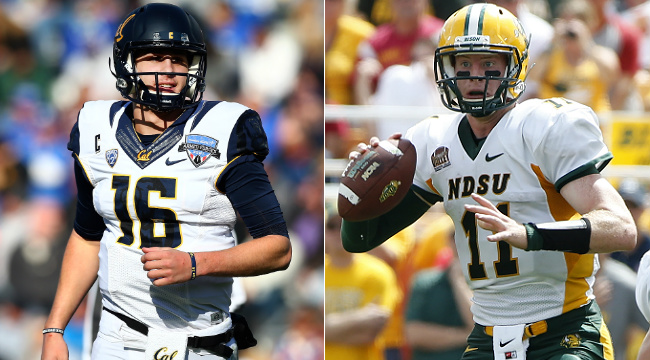
Do you have any other thoughts looking back on how to build the early stages of a NFL career? What would you say to a rookie?
I don’t know what I would say, to be honest because … I think the thing I would say is be confident because I don’t think anybody truly understands — and I know I didn’t — the meat grinder of a world that they’re actually getting into.
The NFL is a multi-billionaire industry that whole-heartedly does not care about you. As a person. They care about your ability to generate ticket sales and sell jerseys and put a product on the field that can help them sell sponsorships. The moment you cannot do that for them anymore you are of no use to them.
Now, the NFL is an incredible place to make a large amount of money in a short amount of time at a very young age. For 99 percent of the people out there, the NFL is a short-term spring board to build a financial base and launch yourself into a lifelong career outside of football. Well I shouldn’t say outside of football. I should say outside the NFL.
Have the confidence to take advantage of it. Have the confidence to believe in yourself that you can do it. Have the confidence but be very aware that the people you’re dealing with, the majority of the time, are not going to be your friend. They are there to make money off of you.






